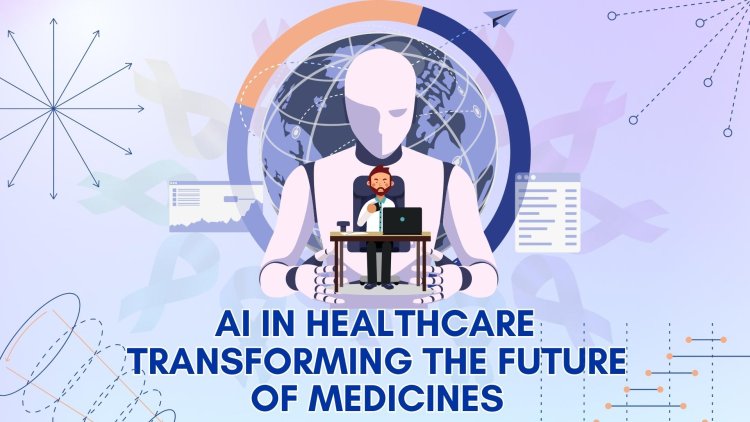AI in Healthcare: Transforming the Future of Medicines
In this comprehensive blog, we will explore the ground breaking ways in which AI is reshaping the health industry and its profound impact on healthcare delivery and patient care.

Introduction:
The healthcare industry is experiencing a profound transformation with the integration of artificial intelligence (AI) technologies. AI has the potential to revolutionize healthcare by improving diagnostics, enhancing treatment outcomes, enabling personalized medicine, streamlining administrative processes, and empowering patients.
In this comprehensive blog, we will explore the ground breaking ways in which AI is reshaping the health industry and its profound impact on healthcare delivery and patient care.
AI in Disease Diagnosis and Medical Imaging:
Artificial intelligence has emerged as a powerful tool in disease diagnosis and medical imaging. Companies such as IBM Watson, Google Health, and NVIDIA are at the forefront of developing AI-driven diagnostic systems. AI-powered diagnostic assistance is revolutionizing healthcare by leveraging machine learning algorithms to aid in early disease detection and accurate diagnosis. These algorithms enhance diagnostic accuracy and efficiency through AI-based pattern recognition. Real-world applications of AI-assisted diagnostic tools are evident across medical specialties.
Medical imaging is undergoing a transformation with the help of AI algorithms. Companies like Zebra Medical Vision and Aidoc are pioneers in AI-powered medical imaging. These algorithms have revolutionized medical imaging interpretation and analysis, enabling the detection and diagnosis of diseases using AI-powered image recognition. Computer-aided diagnosis (CAD) systems, driven by AI, have made a significant impact on radiology, assisting radiologists in providing more accurate and efficient diagnoses.
AI in Personalized Medicine and Treatment:
The field of personalized medicine has been revolutionized by AI. Companies like Tempus and Deep Genomics are utilizing AI-driven genomics to enable personalized treatment options. Precision medicine, tailored to individual patients, is empowered by AI-driven algorithms that analyze patient characteristics. These algorithms enable healthcare providers to customize treatment plans and optimize patient outcomes. Numerous examples demonstrate the application of AI in precision medicine, offering new hope for patients with complex medical conditions.
AI is also playing a crucial role in drug discovery and development. Companies like Insilico Medicine and Atomwise are leveraging AI to accelerate the drug discovery process. The traditional drug discovery process is time-consuming and costly, but AI-driven approaches are accelerating this process by leveraging vast amounts of data. Virtual screening techniques and prediction of drug efficacy through AI algorithms have the potential to transform the pharmaceutical industry. AI is also streamlining clinical trials by analyzing large datasets and identifying patient cohorts, leading to more efficient and effective drug development.
AI in Healthcare Operations and Administration:
Administrative processes in healthcare are being transformed by AI, leading to improved efficiency and reduced errors. Companies like Olive and Innovaccer are developing AI-powered solutions for healthcare operations and administration. Tasks such as appointment scheduling, billing, and documentation are being automated, saving time for healthcare professionals and enhancing patient experience. AI chatbots and virtual assistants are being utilized to improve patient engagement and support, providing timely and accurate responses to patient queries.
Predictive analytics, powered by AI, are optimizing healthcare resource allocation. Companies like Qventus and LeanTaaS are using AI algorithms to analyze vast amounts of data and forecast patient demand. This enables healthcare organizations to allocate staff and resources efficiently. Preventive maintenance and equipment management are also benefiting from AI-enabled systems, ensuring uninterrupted delivery of quality healthcare services.
AI in Remote Patient Monitoring and Telemedicine:
Remote patient monitoring is revolutionizing healthcare delivery with the help of AI. Companies like Current Health and Biofourmis are developing AI-powered wearable devices for continuous health monitoring. These devices provide valuable insights into patient health and allow for early detection of health deterioration. Timely intervention based on AI-driven alerts can significantly improve patient outcomes and reduce healthcare costs.
Telemedicine, empowered by AI, is transforming the way healthcare is delivered. Companies like Teladoc Health and Amwell offer AI-powered telemedicine platforms that facilitate remote consultations. These platforms enable healthcare providers to diagnose and treat patients from a distance. Virtual triage, diagnosis, and treatment options are becoming increasingly accessible, bridging the gap in healthcare access for remote or underserved areas.
Ethical and Regulatory Considerations:
As AI continues to advance in healthcare, ethical and regulatory considerations become paramount. Privacy and security concerns arise due to the vast amounts of patient data processed by AI systems. Compliance with data privacy regulations, such as HIPAA and GDPR, is essential to ensure the protection of patient information.
Addressing biases in AI algorithms is crucial to ensure fairness in healthcare decisions. Transparent and accountable AI systems are needed to overcome bias and deliver equitable healthcare outcomes. Human-AI collaboration is vital, as healthcare professionals play a crucial role in the integration and responsible use of AI technology.
Conclusion:
Artificial intelligence is poised to revolutionize the health industry, transforming diagnostics, treatment, healthcare operations, and patient care. The integration of AI has the potential to improve accuracy, efficiency, and patient outcomes in healthcare delivery. Companies like IBM Watson, Google Health, Zebra Medical Vision, Tempus, Insilico Medicine, Olive, Current Health, and Teladoc Health are among the many innovators driving AI advancements in healthcare. By striking a balance between AI-driven advancements and human expertise, we can unlock the true power of artificial intelligence to reshape the future of healthcare.












